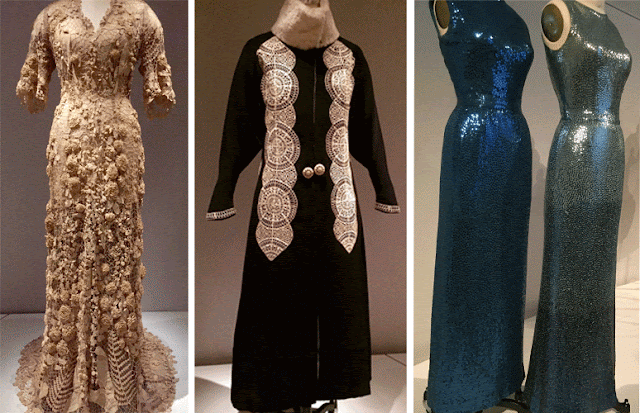When fabrics combine hand, machine and technology
 |
| Iris van Herpen, 2012. 3-D printed epoxy |
The show is full of beautiful objects, but its focus is on how fashion designers have embraced machines and technology to create new works. Almost all designs are from the early 20th century to the present. The exception is an 1870 Irish crocheted wedding dress.
Ranging from haute couture to prêt-à-porter, some of the works are very avant-garde--and barely wearable. Like the cast fiberglass 'statement' dress that releases maple-seed-like elements by remote control. But the majority of the 170 ensembles are not only very wearable, but elegant and timeless.
 |
| Iris van Herpen dress, 2013-14. |
Fabric meets technology
 |
| Gareth Pugh, 2015-16. |
Another van Herben dress (at left) is strangely dark and highly textured. Its fabrication, fascinating. Cotton twill fabrics was hand-painted with polyurethane resin and iron filings, then hand-sculpted with magnets.
Another dramatic haute couture dress by British designer Gareth Pugh was machine-sewn white sold-wool gazer with an overlay of white mesh and hand-embroidered with clear plastic drinking straws. Prefer one in black? He has one of those, too.
 |
| Alexander McQueen, 2014-15. |
Feathers, pleats, lace, leather...and more I almost had visual overload on the many ways feathers were incorporated into dresses and capes. One Alexander McQueen ensemble (2014-15) is covered with embroidered ostrich and goose feathers.
 |
| Junya Watanabe, cape. 2015-16 |
 |
| Hussein Chalayan, "Duck dress." 2000. |
Scissors are always at hand, but not in the way British designer Hussein Chalayan used them to create his prêt-à-porter "Duck" dress. He cut away shapeless bales of pink tulle fabric by hand until he had a female shape. Kind of like shaping boxwood hedges, I guess.
There is much, much more. If you can't get to the exhibition, consider purchasing the Manus x Machina catalog.
And here are a few more dresses that I found particularly stunning.
 |
| L-R: Irish crochet wedding dress, 1870. Paul Poiret.Coat-wool, leather. c.1919. Norman Norell, evening dress. 1965 (prêt-à-porter) |
 |
| L-R: Givenchy, 1963. Dior "Venus, 1949-50. (haute couture) Alexander McQueen, 2012 (prêt-à-porter) |
Such beautiful pieces. I would love to check this out. And i really like how you explained everything so well. It was such an interesting read. Thanks!
ReplyDeleteThe Met has digitized many of their collections and made them available online. You might check to see if this one is--and if not this one, surely you'll find others that you like!
Delete